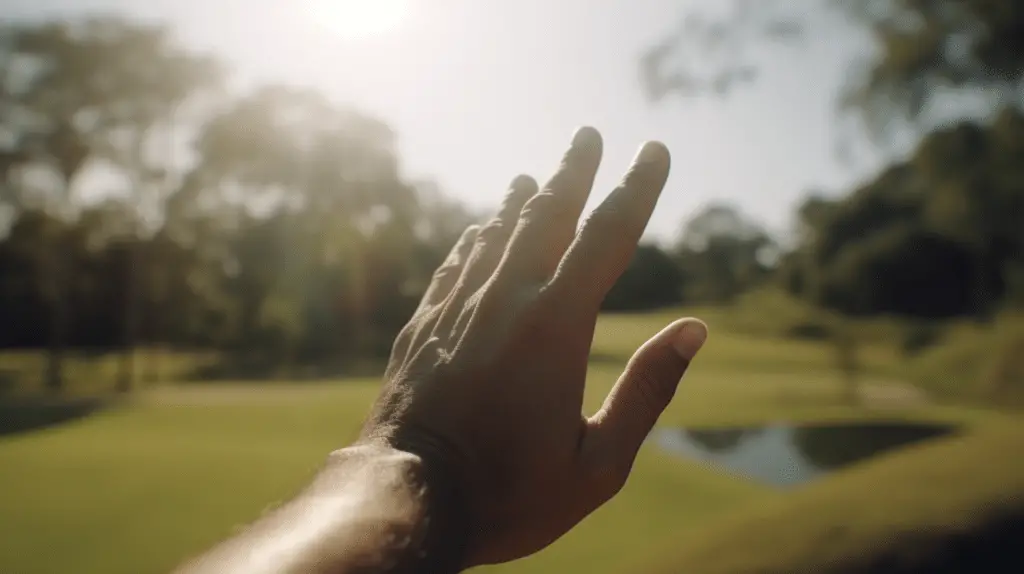Last Updated on June 11, 2023
Golf is a beloved sport, enjoyed by people around the world. But unfortunately, it’s not uncommon for even experienced players to be hindered by ‘the yips’ – when an otherwise consistent swing suddenly becomes erratic and unpredictable. This can lead to frustration and decreased enjoyment of the game. If you’re struggling with this issue, don’t despair! In this article, we’ll show you how to stop the yips in golf and get your swing back on track.
Definition and Causes Of The Yips
The yips is a phrase used in golf to describe a golfer’s inability to perform consistently on the course. It can be caused by stress, anxiety, or an uncomfortable grip on the club. The yips typically manifests itself as trembling hands and jerky movements while trying to hit a shot. This phenomenon affects many golfers at some point in their career and usually has no easy remedy.
The sources of this affliction are frequently attributed to physical and/or emotional triggers. Physically speaking, tension in the arms, wrists or hands can cause a golfer’s muscle memory to break down during their swing. This tension is usually caused by over-swinging or an incorrect grip that leads to involuntary jerking motions when swinging at impact. In addition, lack of flexibility and strength could be contributing factors as well.
Mentally, fear and anxiety often come into play with the yips. Fear of missing a putt or hitting it too long can create stress on the body which then manifests itself through physical symptoms like shaking or trembling hands that disrupt one’s ability to properly execute a golf shot. Other mental issues like focus problems, excessive worrying about results and self-doubt can all lead to increased feelings of pressure resulting in a golfer succumbing to the dreaded yips.
Clearly, mastering control over our emotions while maintaining proper form physically can be beneficial for any golfer looking to eliminate those pesky yips from their game
Identifying If You Have The Yips
If you have experienced a sudden change in your golf performance, it’s possible that you may have the yips. The yips are involuntary muscle contractions or spasms while performing simple tasks such as putting and chipping during a game of golf. Here is what to look for if attempting to diagnose yourself:
Grip Changes
- Different hand placement when addressing the ball
- Lack of grip pressure on the club handle
- Increasingly tense grip with each stroke
Swing Movement
- Uncontrollable jerking movements
- Sudden changes in swing path
- Inability to complete backswing due to fear
Mental Symptoms
- Fearful thoughts about missing shots
- Self-doubt when planning your shot selection
- Loss of confidence before and after hitting shots
Depending on how many symptoms you identify with, it will help determine whether or not you have developed the yips. If so, seeking professional guidance from a coach can be extremely beneficial in helping manage this condition and improving your golf game overall.
Pre-Shot Routine

Now that you’ve identified if you have the yips, it’s time to prevent them from occurring. A pre-shot routine is one of the most effective ways for doing this. Before a golfer takes their swing, they will go through a series of steps in order to help build confidence and keep their focus on the task at hand.
These steps may include visualizing the shot, taking practice swings, setting up with proper posture and alignment, and focusing on an intended target. This type of routine helps golfers stay calm and focused while playing as well as boosts their overall golf confidence. It also prevents any anxiety or negative thoughts from entering into their mind before they take their shot–which can be a major cause of the yips.
By developing your own personal pre-shot routine before every hit, you’ll be able to gain control over your game and significantly reduce the chances of getting the yips. You should always try to make sure your pre-shot routine follows the same consistent pattern each time which provides familiarity and structure for yourself when playing golf. Remember, having a solid pre-shot routine is essential for reducing anxiety levels during play and helping you get back in control of your game!
Practice Drills
Practicing drills is an important part of stopping the yips. Start by doing a simple drill called the “yip drill”. This involves standing in your normal setup position, and then taking practice swings while making sure that you keep your body still during the entire time. Doing this will help to build muscle memory so that when it comes to actually hitting shots on the course, your body will know what to do without having to think about it too much.
In addition to physical drills, there are also mental drills you can do. When practicing these, focus on positive thinking and deep breathing. Visualize yourself executing perfect shots before each swing and remind yourself of all the good golf shots you’ve hit in the past. If negative thoughts start creeping into your mind during a round, take some deep breaths and remember why you love playing golf. With regular practice of these techniques, you’ll be able to stay focused and reduce anxiety levels out on the course – leading to improved performance and lower scores!
Relaxation Techniques
Relaxation techniques are extremely helpful for reducing the yips in golf. These exercises help to reduce stress and anxiety, allowing players to focus on their mental game instead of worrying about physical issues. There are a variety of relaxation activities that aid in calming both body and mind:
| Activity | Description | Benefits |
|---|---|---|
| Deep Breathing | Slow inhalations and exhalations from deep within the abdomen | Reduces stress levels, relaxes muscles, increases oxygen flow |
| Meditation | Sitting still and focusing on breathing patterns or mantras | Focuses attention away from thoughts causing stress & anxiety |
| Visualization | Imagining oneself succeeding in a situation where one has previously failed | Boosts confidence by mentally practicing success scenarios & improves performance during actual play |
| Muscle Relaxation Exercise | Tensing then releasing each muscle group while inhaling & exhaling slowly | Helps clear the mind and relieves tension throughout the body |
Using these strategies can provide immense relief to golfers suffering from the yips. Mental training is also very important; learning how to remain calm despite any errors made helps avoid further mistakes during gameplay. It’s key to remember that everyone makes mistakes – acknowledging them without berating oneself allows for more positive results overall. With regular practice of these techniques, anyone can learn how to control their emotions better when playing golf, resulting in improved scores over time.
Short Game Improvement Exercises
The short game is the key to lowering your score in golf. Improving your skills around the green can help you consistently save strokes and get out of tricky situations on the course. Here are a few exercises that can help improve your short-game:
- Chip Shot Drills – Use these drills to develop good technique, consistency, and accuracy with chip shots. Try various clubs and distances so you’re prepared for any situation you may face during a round.
- Putt Practice – To become a great putter, practice regularly by setting up mini games or challenges when hitting balls at the range or outdoor putting green. This helps make practice more fun while improving your touch and feel on critical putts.
- Target Training – Choose specific targets to hit from different angles, which will build confidence as well as trust in yourself to execute chips and pitches correctly under pressure.
- Around The Green Challenges – Create a variety of scenarios such as bunker shots over water hazards, tight lies next to trees etc., then challenge yourself to see how quickly you can escape this kind of trouble without taking too many extra swings.
This type of training should be incorporated into regular practice sessions not just occasionally but consistently if improvement is expected in one’s game. With some dedication, effort, and focus it is possible to lower scores significantly through better shot selection and improved execution around the green.
Frequently Asked Questions
What Other Mental Blocks Can Be Associated With The Yips?
The yips, a common term in golf, refer to an affliction that affects the nerves and muscles of a golfer. It’s characterized by sudden jerks or spasms during the swing process, resulting in poor shots and ruined confidence. But it isn’t just the physical aspects; there are many other mental blocks associated with the yips as well. Overthinking, nerves, and anxiety can all wreak havoc on performance if not addressed properly.
Golfers experiencing these issues may find themselves over-analysing every decision they make before hitting the ball. This often leads to paralysis by analysis — taking too long to decide what shot should be taken next or how hard it should be hit. If left unchecked, this can lead to further tension within their body which interferes with proper swing mechanics. The longer these feelings remain unacknowledged, the more likely they will develop into full-blown yips.
In order for golfers to overcome such obstacles, they must begin by recognizing that any mental block is present at all. Once identified and understood, they can start working on strategies aimed at controlling their thoughts so that they don’t spiral out of control while playing golf. Taking deep breaths when feeling overwhelmed can help relax tense muscles and calm racing minds. Additionally, focusing on positive self-talk instead of negative criticism has been known to lift spirits and improve overall focus levels during playtime. Working through these steps slowly but surely will eventually allow players to regain trust in themselves – enabling them to take back control of their game without worrying about developing yips or other types of nervousness again.
Are There Any Physical Techniques That Can Help Reduce The Yips?
Are there any physical techniques that can help reduce the yips? Yes, there are several methods of physical training and relaxation that could prove beneficial in reducing the effects of the yips. Golf swing drills, muscle relaxation techniques, and grip changes are all viable options to explore when looking for ways to improve your golf game while dealing with this condition.
Firstly, golf swing drills can be used to focus on specific aspects of your technique. By focusing on elements such as stance or posture, you can better fine-tune your movements during a round of golf. Additionally, these drills can also strengthen any weak areas in your technique which may have caused the onset of the yips initially.
Secondly, utilizing muscle relaxation techniques is another way to address this issue. Relaxing both body and mind before taking shots will allow you to remain calm and focused throughout each stroke. This not only helps boost confidence but it also allows for more precise control over basic motor skills associated with golf. Furthermore, some people find breathing exercises helpful in calming them down before they tee off or hit their ball out of roughs or bunkers.
Finally, changing one’s grip has been shown to make a difference when trying to reduce anxiety related to playing bad rounds due to the yips. Trying different grips such as interlocking fingers together or switching up how tight/loose you hold onto a club can lead to improved performance and less stress overall:
1) Interlock Fingers – Allows for greater accuracy in shots by providing stability
2) Looser Grip – Helps keep arms relaxed resulting in smoother swings
3) Firmer Grip – Enhances power behind strokes so one doesn’t lose distance
These physical strategies offer players an opportunity to practice mindful awareness while engaging in the sport which should provide relief from symptoms associated with the condition known as “the yips”. With consistent effort put into each method discussed above, anyone struggling with this mental block should notice positive results soon after implementation.
Is There A Time Frame In Which The Yips Can Be Cured?
Unfortunately, there isn’t an exact timeline as each golfer’s experience with the yips will vary depending on individual circumstances. In some cases, understanding and utilizing positive mental techniques such as visualization and goal setting may help cure or reduce symptoms within weeks or months. However, more severe cases could take up to two years before seeing any improvement. Yips healing times depend greatly on factors such as severity of symptoms, level of commitment from the golfer, type of training used (mental vs physical), etc.
It’s important for golfers suffering from the yips to remember that patience and determination are key components in achieving success. Working with a qualified professional who specializes in treating issues related to performance anxiety can also speed up recovery time significantly. With hard work and dedication, those struggling with the dreaded “yips curse” can look forward to getting back out onto the course soon!
Are There Any Long-Term Effects Of Having The Yips?
Fortunately, there is good news when it comes to this issue: while having the yips can be uncomfortable or embarrassing at times, studies have shown that they don’t usually cause any lasting harm to one’s golf swing over time. In fact, with proper coaching and treatment from a professional instructor, most players who suffer from the yips will find relief within a few weeks or even days – depending on the severity of their condition. That said, if left untreated for too long, some aspects of one’s game such as timing and accuracy could become permanently impacted.
It is therefore important to seek help right away whenever symptoms of the yips start presenting themselves during play. Taking action early will ensure that you receive the best possible care so you can get back to enjoying your golf game without worry.
Conclusion
The yips are a frustrating mental block that can make it difficult to enjoy the game of golf. Although there is no definite cure, understanding what causes them and finding ways to reduce their occurrence can help lessen the impact they have on your game. The most important thing to remember when dealing with the yips is to stay positive and work through any difficulties you’re facing.
Even if we don’t find an immediate solution for our problems with the yips, reminding ourselves that this condition isn’t permanent helps put things into perspective. With enough dedication and practice, anyone suffering from the yips can work towards improving their game over time – one step at a time.



